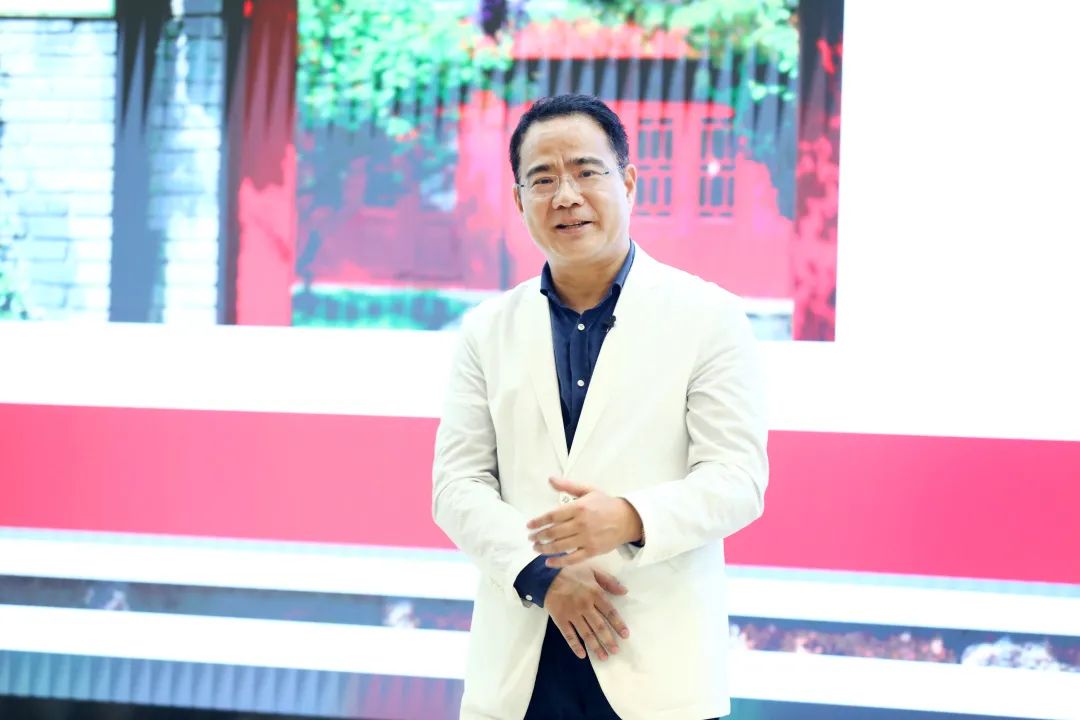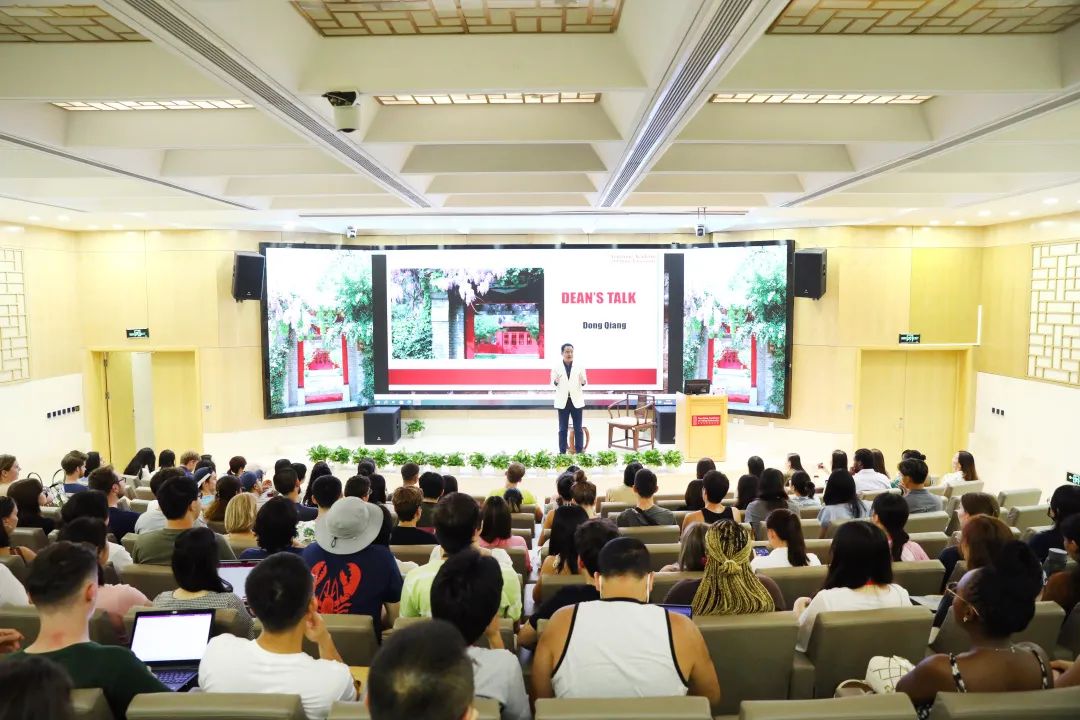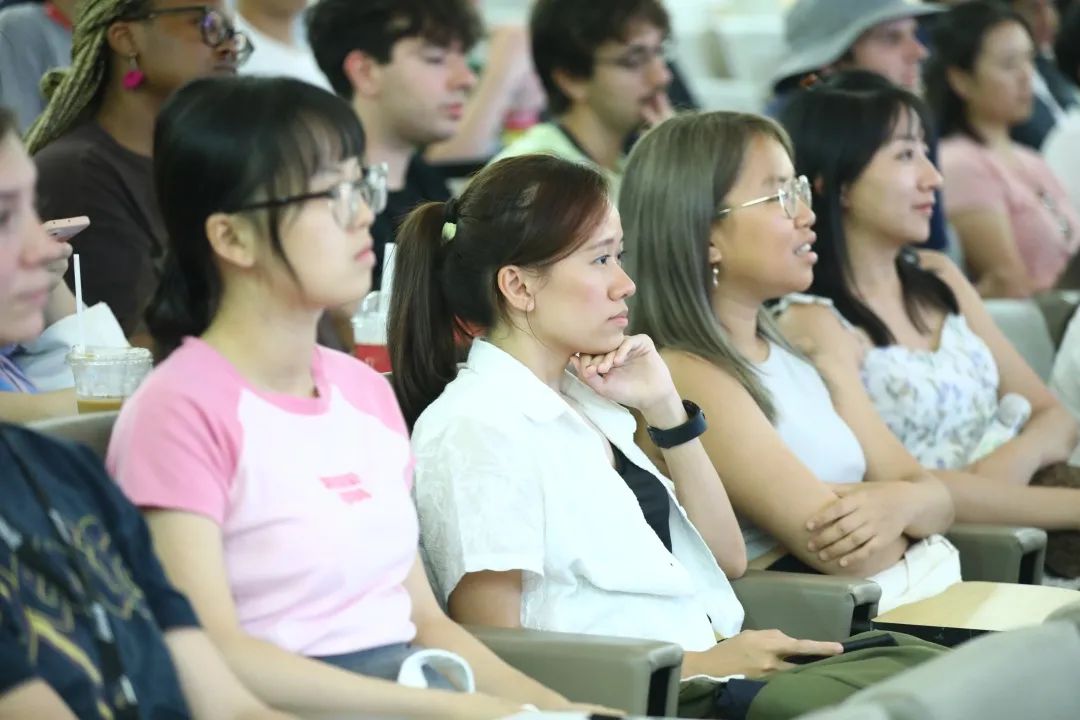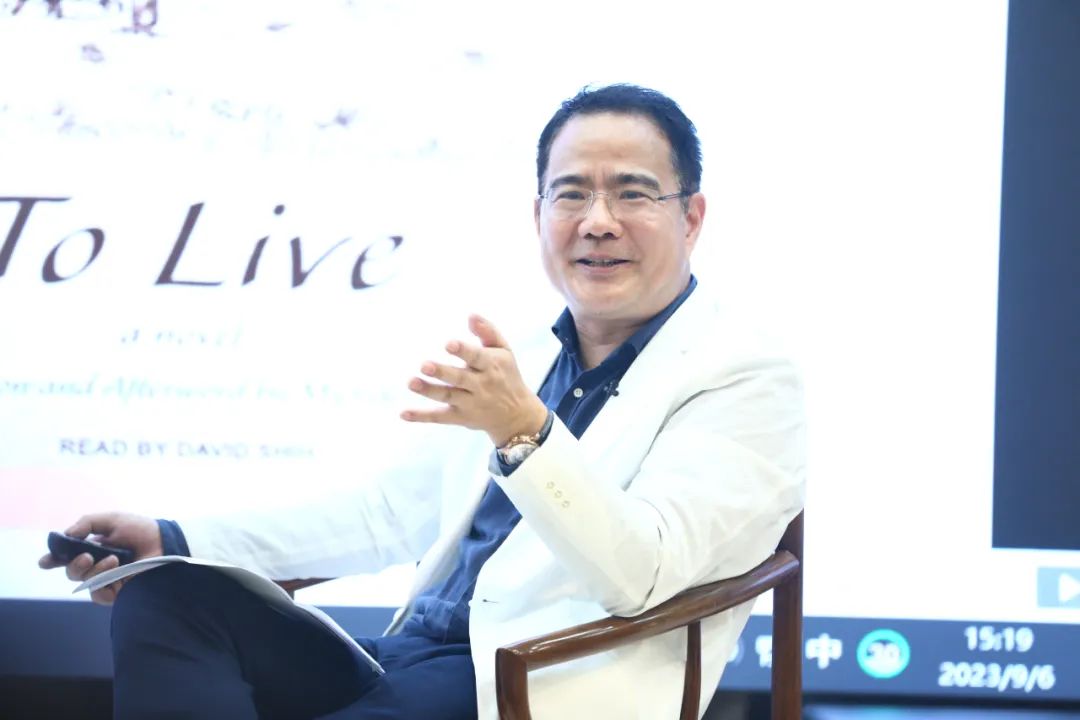On September 6, Yenching Academy Dean Dong Qiang delivered his first Dean’s talk for the year titled “‘With My Warm Palm…’ Reading China Through its Literature” to a room teeming with enthusiastic Yenching Scholars from the 2022 and 2023 cohorts. The session, Professor Dong Qiang’s first-ever lecture delivered entirely in English, was designed to introduce the students to some of the most important pieces of Chinese literature to help them better understand China, the country they have been invited to discover. The lecture covered non-fictitious and fictitious works across different forms of literature – poetry, drama, and prose – and literary genres, including magical realism, horror, science fiction, historical, romance, and fantasy.

Dean Dong began the lecture discussing four fundamental myths about Chinese origin – a kind of cosmogony – epitomized in several significant subjects: Pangu’s separation of the sky and earth; Nǚwa’s creation of human beings and mending of the sky, following natural disasters that caused a sky rift, with colorful stones; Hou Yi shooting down nine suns, and Chang’e, Hou Yi’s wife, flying to the moon; and Cangjie’s creation of the Chinese writing system. Prof. Dong moved on to introduce Dai Wangshu’s poem, “With My Damaged Palm”, noting that the poet tried to “touch” the whole expanse of China, with his palm “damaged” by the war, to rediscover the entire nation from the north to the south. “The title of this lecture is inspired by his poem… ‘With my warm palm’, I would like to touch, through this lecture, the land of China using some of the most important masterpieces of Chinese literature, traditional and modern,” the Dean described.
Prof. Dong sorted the authors according to two of China’s most important rivers – the Yellow River and the Yangtze River – that have nourished Chinese civilization for centuries. Firstly, he examined several pieces of literature along the Yellow River, including Wang Zhihuan’s “On the Stork Tower”, Jia Pingwa’s “Qin Opera”, Chen Zhongshi’s “White Deer Plain”, Mo Yan’s “Red Sorghum”, and Pu Songling’s “Strange Stories from a Chinese Studio”.

The discussion transitioned to cover literary works along the Yangtze River, including Li Bai’s “Seeing Meng Haoran off to Yangzhou”, Du Fu’s “A Traveler at Night Writes His Thoughts”, Fan Zhongyan’s “Tribute to the Yueyang Tower”, and A Lai’s “Red Poppies”. Moreover, Prof. Dong examined several significant literary pieces that drew inspiration from the south of the Yangtze River, including Lu Xun’s “The True Story of Ah Q” and Yu Hua’s “To Live”. “Around the Yangtze River, there is an interesting and important term called ‘South of the River’ (江南Jiāngnán). Jiangnan is a geographical term and a cultural concept. The region’s limits are somewhat challenging to define, and it’s the synonym for—the delicateness and the fineness of—developed civilization.”Dean Dong noted.
Prof. Dong explained that Jiangnan is famous for its beautiful gardens, mountains, and lakes, inspiring wonderful literary works. In this vein, he reviewed three pieces narrowly connected with life in the gardens or an environment of gardens: “Dream of the Red Chamber” by Cao Xueqin, “The Gourmet” by Lu Wenfu, and “Raise the Red Lantern” by Su Tong. Similarly, Prof. Dong discussed two authors connected with the mountains and lakes of the south of China: Shen Congwen’s “The Border City” and Gao Xingjian’s “The Soul Mountain”.
He further discussed Zhang Chengzhi’s “My Beautiful Black Horse” owing to its connections to the mountain ranges of Inner Mongolia. He mentioned that he translated Zhang Chengzhi’s book into French, adding that “the story aptly captures the cultural gaps in Chinese society between a modernizing Han majority and rural minorities, … and I wanted the French to access this book because of its quality content… also Chinese books were scarce in France”.

Through these works, Prof. Dong took the Scholars on a journey across Shaanxi and Shandong (the Yellow River), Tibet, Hunan, Guangxi, Guizhou, Sichuan, and Inner Mongolia (the Yangtze River), exploring the ethnocultural, historical, socioeconomic, intellectual, and spiritual evolution of the Chinese society, especially the countryside, embodied in the narratives of thoughtfully developed characters and plots.
In a bid to shift from discourses about the countryside, Dean Dong explained that novels, as a form of literature, directly relate to metropolitan lives. Hence, he explored some works of literature in China’s two biggest cities – Shanghai and Beijing. He shared the works of two Shanghai writers – Mao Dun (“The Midnight”) and Wang Anyi (“The Song of Everlasting Sorrow”) – carefully detailing their works’ core contents which illustrate the nature of wealth, modernity, love, and beauty, and the influences of colonialism and capitalism in modern-Shanghai.
Next, the discussion centred on literature from Beijing, covering Lao She’s “The Tea House” and Hao Jingfang’s “Folding Beijing”. Prof. Dong explained, “The experiences and destinies of the different characters in these works reflect the old and new Beijing social landscapes, revealing the characteristics of the times in the broadest possible way and highlighting Beijing’s robust local cultural colours and social outlook across different periods.”
Prof. Dong concluded the Dean’s Talk by explaining that translation assures an openness of the spirit of the people who never lose sight of foreign countries and their ideas and that several languages have their spokespeople in China, including Zhu Shenghao and Li Wenjun (English), Fu Lei (French), and Ye Weiqu (Japanese). Additionally, he noted that literature, both traditional and modern, “is about the vision of reality, reflecting the collective vision people have accepted, even if they are, above all, visions of an individual: the writer.” Hence, he hoped the Scholars would be able to touch the reality and better understand China through reading different pieces of Chinese literature.

A Q&A session followed immediately after the lecture. The first question delved into the kinds of processes Dean Dong undertakes before choosing the works he translates from Chinese into French or vice versa. Dean Dong explained that, in many cases, the editors or publishing houses decide or initiate the process since publishers usually know which translator is the most ideal for specific translation tasks owing to their reputation. Moreover, he added that while in Paris, he was shocked by the scarcity of translated pieces of Chinese literature; hence, he decided to translate several Chinese books. He also discussed that translation involves extensive research, a firm grasp of the languages, and a clear description of why the author and their works are worth reading. “When I do translation, I prepare the ground by writing a detailed preface/introduction to introduce the writer to the reader by describing why the writer is interesting and important, and their place in Chinese literature today.”
Another question peered into how translators handle situations when they hit a cultural or linguistic brick wall that hampers their ability to deliver a comprehensive translation of the original text. Prof. Dong explained that while the problem may arise when translators attempt to translate between a popular and a not-so-widely-spoken language, he reminded the audience that translation is never about the direct change of one word for another between languages since equivalent terms rarely exist. He highlighted the role of subjectivity in the translation process since we are all human beings who live in a society and are guided by norms and ideas that differ across spatio-temporal contexts. Hence, Dean Dong noted that a translator needs to transcend their thoughts and enter into the author’s mind because only “when you enter into the author’s universe, will you realize the logic, systematic structures, and organic meanings of their ideas and writings and make it possible in your language.” It is at this point that the readers can understand the same organic system.